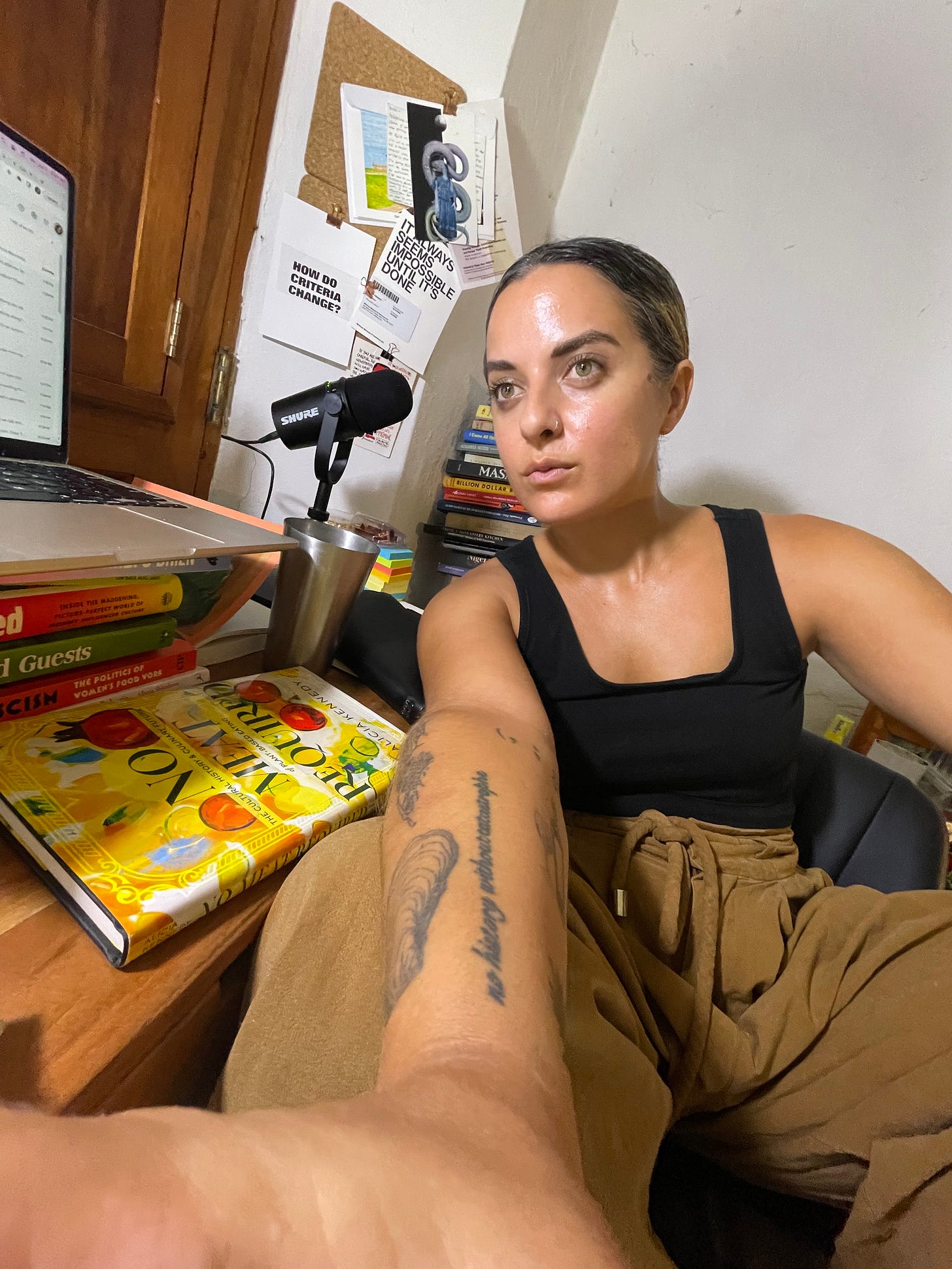Today is the first release of my new series Creative Conversations, and I’m thrilled to share this interview with you all. I met Alicia via Twitter years ago, and then IRL (also years ago). Her Substack, From the Desk of Alicia Kennedy, is wildly successful and beautifully written. Its been featured in New York Times, The Nation, Eater, and Vogue (amongst many others). Alicia’s writing has also recently appeared in Foreign Policy, Bon Appétit, SSENSE, and Harper’s Bazaar.
Alicia’s writing is truly special because of the ways she intermingles the personal, culinary, and political. In my opinion, she could teach a master class on how to maintain presence and intimacy in personal writing while also teaching your reader about new concepts and expanding their worldviews. I’ve long admired the ways in which she fearlessly shares her thoughts, opinions, and point of view.
Her first book, No Meat Required: The Cultural History and Culinary Future of Plant-Based Eating, is an important investigation of the origins of vegetarianism and veganism and the current state of the "meatless” movement.
If you Google Alicia Kennedy, you’ll find a treasure trove of interviews and writing, both by and about her.
Keep scrolling to read Alicia’s responses to my Creative Conversations interview questionnaire!
How did you come to writing?
I always wanted to write, but what kind of writer I would be was always up in the air. As a small child, I wrote poetry in sticker books. In third or fourth grade, I remember putting together my first attempt at a zine on a school computer. A teacher suggested a fifth grade boy help me with it, and he re-styled my title to be in capital letters; this was the first moment I realized I might not want to work with other people, especially not boys.
As a teenager, I only wanted to write about music; as a young adult, I only wanted to write about books. My life only came together when I started to cook. Food was the key for me to being a writer, which I never could have anticipated.
What are some features of your writing life?
I write for all of my money, so I am very strict in my schedule to put together my weekly newsletter, where I get the bulk of my income. Otherwise, I am reading, scrolling, cooking—seeking whatever inspiration that will end up in the newsletter or as a pitch for other publications. I could use more money, like anyone, but I appreciate for now that I have a good quality of life. After many years of being overworked at magazines, or overworked as a freelancer attempting to survive in Brooklyn, I am enjoying this time when I am certainly working quite a bit, but also have the luxury of time to think.
Where do you turn when you need inspiration?
My favorite essay of all time, that I read regularly when I need to be reminded of what writing is, is "The Radiant Child" by Rene Ricard. It reminds me of my purpose, though he wrote about art and I write about food: "I consider myself the metaphor of the public. I’m a public eye. And I only hype the sureshot."
Tell me about something you struggle with as a writer.
Being understood, because writing about food invites a lot of thoughtless misogyny about what that means: recipes, consumption, titillation. I want to have food as my foundation but I also want do something other than incite people to certain ways of eating.
If you had to settle on three texts that changed your writing or the way you understand writing, which three texts would you choose?
My Struggle by Karl Ove Knaussgard
The Importance of Being Iceland by Eileen Myles
“On the Death of the Author,” a short story by Alvaro Enrigue
(listen to Alicia talk about My Struggle on the Our Struggle podcast)
If you could time travel to your baby writer self, what would you tell yourself?
The same annoying thing my dad told me all the time when I was a kid: patience is a virtue.
What does being a writer mean to you?
It means I'm actively in conversation with everything I encounter.

I’m so grateful to Alicia for being the first writer/artist featured in this series. Her answer to the final question is so succinct and profound. The act of entering into a conversation with all that one encounters is one experienced by so many writers and artists. When we translate the world through any medium, it must be a conversation, right?
I’d love to hear your thoughts about this interview, Alicia’s work, and/or your own work.






I loved all of these questions and I love Alicia. I’ve never been interested in food writing until I stumbled upon her Substack. She has a way of taking the reader sentence to sentence seamlessly. she hooks me.
For a second, I thought someone had published a response called “Meat Requiered”
I hope that doesn’t happen.